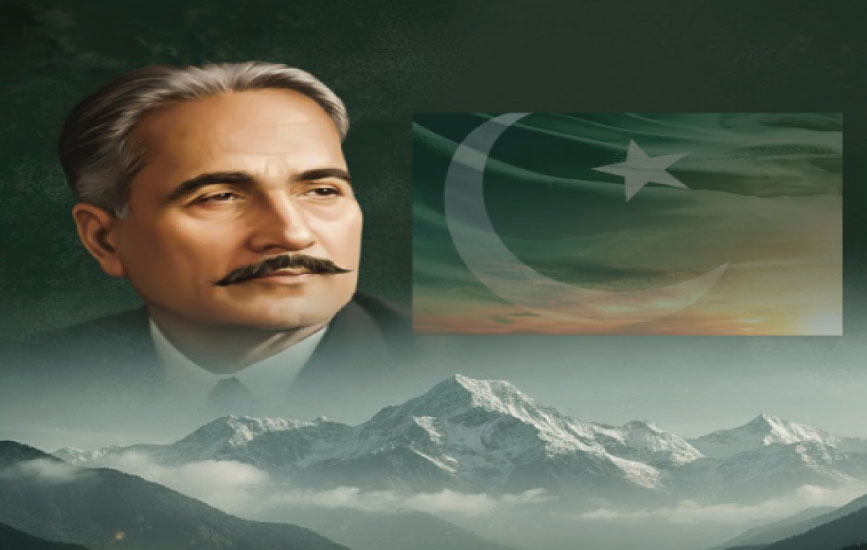There are very rare moments in the history of the world where the vision of a person transcends politics, geography, and time. Dr. Allama Muhammad Iqbal, a Kashmiri descendant, stood among those visionaries, a philosopher-poet and scholar whose roots lay deep in the valley of Kashmir, yet whose dream gave birth to the idea of Pakistan.
Iqbal holds the title of the Poet of the East. His life was not just a tale of intellect or inspiration, but a Kashmiri soul that refused to remain silent in the face of spiritual disintegration and social downfall. The deep-rooted connection between Pakistan and Kashmir is not only religious, it is historical, emotional, cultural, and spiritual.
He envisioned what is today known as Pakistan. Iqbal, the son of Kashmir, not only dreamed of a separate homeland for the Muslims of the sub-continent, but also contributed with the founder of Pakistan, Quaid-e-Azam Muhammad Ali Jinnah, to make this dream a reality. He brought revolution through his poetry, the verses that motivated the Muslims of the sub-continent to struggle for their identity, and he also holds the title of revolutionary poet. The destinies of Kashmir and Pakistan in his vision are inseparably linked and bounded by shared identity, culture, and faith.
His intellectual evolution was more than the quest for philosophy and poetry; it was the revival of the suppressed Muslim Ummah. He knelt to observe the Muslims of the sub-continent in a state of Socio-political decline and struggle to awaken and revive their selfhood (Khudi).
His vision and verses gave the message to the Muslims not to despair but to awaken and retrieve their unity, spirituality, and dignity. For him, Islam was not only a set of rituals, but a vital force that can alter both an individual and nations.
The historic Allahabad address of 193, in which he presented his remarkable vision, not only by drawing a political boundary, but also a moral and spiritual homeland in which the Muslims have the liberty to live freely and can protect their faith and identity.
The founder of Pakistan, Quaid-e-Azam, later endorsed his vision and struggled to transform it into reality. The vision of Iqbal for the ideological framework of Pakistan is undeniable, and it was created not just as a piece of land but with a profound and moral purpose rooted in faith, identity, and justice.
It is this moral foundation that links Pakistan’s identity to the unfinished story of Kashmir’s freedom. Both Kashmir and Pakistan are bound by faith, history, and culture by the same dream that first took shape in the mind and heart of Iqbal.
The journey of this Kashmiri descendant in Sialkot to the spiritual father of Pakistan shows the unbroken and significant bond between Kashmir and Pakistan. His vision is that the soul of Pakistan can never be complete without the freedom of Kashmir. His connection to Kashmiri roots remained an inextricable part of his identity and thought. He expresses the plight of the Kashmiris in his poetry, where Kashmir symbolizes both beauty and suffering. In his remarkable poems like “Saqi Nama” and “Armaghan-e-Hijaz,” he mentioned the miserable conditions of the Kashmiri Muslims under Dogra oppression.
He reminded the nation that every dawn of the sacrifices and struggle leads to a brighter morning of freedom. His beliefs and literature inspire the people of Kashmir as they endure their struggle for their basic right to self-determination. Today, the current situation in Indian Illegally occupied Jammu and Kashmir is under Indian military repression and cultural erasure, and human rights violations, echoes the sufferings that Iqbal highlighted. The words of Allama Iqbal still echo in the valleys of Kashmir, reminding the world of a people who continue to struggle for justice. He envisioned the Muslims of the world as a single body where the pain of any part should be felt the same by all.
In this spirit, today, Kashmir is not merely a land of rivers and majestic mountains; it is the open wound on the heart of the Muslim world. Guided by the philosophy of Allama Iqbal, it is the responsibility of the Muslim world to feel the pain and the sufferings of Kashmiri Muslims and raise their voices for their just cause.
At the same time, the responsibility lies with the international community, which has established moral and legal frameworks for the protection of human rights and upholds their principles. The rights of the Kashmiri people must be upheld, their identity preserved, and they should be free to live their lives according to their faith.
Author: Saba Ghulam Nabi, Research Officer, Center for International Strategic Studies AJK.



